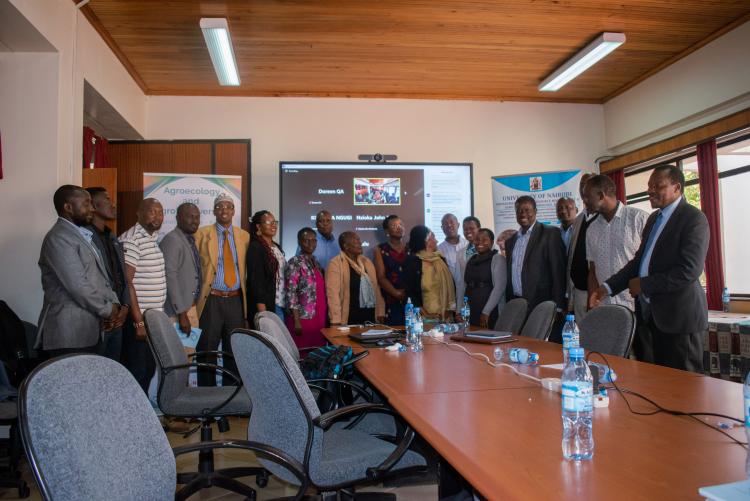The Chairman (Prof. Richard Onwonga) in his introductory remarks, had the following to say.
1). AWARE THAT “In Kenya, the drylands constitute over eighty-nine percent (89%) of the country’s total land area with approximately 35% of human population, seventy percent (70%) of the livestock herd nationally, as well as most of the biodiversity and wildlife.
2). CONSCIOUS OF THE FACT THAT: these drylands experience human-induced land degradation thus threatening the realization of Vision 2030 and the Bill of Rights of the Constitution of Kenya 2010 (CoK) namely, provision of water, food, and protection of the environment for the benefit of present and future generations. Climatic change and inadequate policies exacerbate these threats.
3). COGNISANT THAT: Addressing the threats to dryland productivity requires highly trained and qualified manpower equipped with analytical skills and scientific and technical knowledge necessary for tackling the main challenges in dryland natural resources management for sustainable Development and environmental conservation.
4). FOR THIS REASON, this department on Feb. 24th, 2023, engaged stakeholders on validation of the proposed new undergraduate curriculum – (BSc. in Dryland Sustainability Science and Technology - DSST).
5). THE PROGRAMME: The Bachelor of Science in Dryland Sustainability Science & Technology (BSc. DSST) degree programme is envisioned to apply a transdisciplinary approach, premised on scientific and technical grounding to make students better understand the interactions between the environment, the economy, and society, a critical step in tackling the inherent dryland productivity challenges that undermine their long-term sustainability.
6). ALIGNMENT TO NATIONAL AND INTERNATIONAL GOALS: Of great importance, is that the programme is tailored towards achieving the goals of Vision 2030 as well as meeting international commitments such as the SDGs, in particular, SDGs 1 - No poverty, 2 - Zero hunger, 4 - Quality education, 6 - Clean water and sanitation and 13 - Climate action among others which are meant to transform Kenya’s economic growth and the world at large.
7). ALIGNMENT TO GLOBAL TRENDS: In addition, the programme aligns well with the current global emerging issues such as the 4IR where specific 4IR technologies such as data visualization, location detection, mobile devices, AI and big data / analytic have been covered in most of the course units.
8) CONTRIBUTION OF THE PROGRAMME: The proposed degree programme will therefore contribute towards improving livelihoods of the communities in drylands via sustainable dryland management of resources in the drylands supported through undergraduate tailored training, research and technology transfer, coupled with community-based interventions.
9). OPPORTUNITIES OFFERED: The program is anticipated to spur the young professionals to tackle current and emerging environmental and socio-economic challenges that are local, in the region and international arena. This will not only contribute to enhanced dryland productivity but also increased opportunities for socioeconomic development. With this program in place, the sustainability values of Kenya’s drylands and related ecosystems will be strengthened.
10). THE PROGRAMME PRODUCTS: The BSc. DSST graduates will be endowed with a sound understanding of technical and scientific options and trends to provide practical, advisory, and specialized services in a wide range of fields including dryland ecosystem interactions, food systems, socio-ecological and dryland environment systems. DSST graduates will be agents of change and entrepreneurs in the drylands of Kenya and the rest of Africa.
- Log in to post comments

